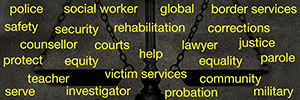- Future Students
- Current Students
- Faculty
- Staff
- Alumni
- Others
Enduring jail with a mental illness

Being in jail is fairly terrifying ... but when you have a mental-health difficulty in that same situation, it's magnified."
Brett Batten has lived with a mental illness since he was 10. In his 30s, Batten was jailed after committing a non-violent offence, and over the next three years, was subjected to a traumatic experience that included time spent in solitary confinement and medical cells.
Eventually, Batten was diagnosed with bipolar disorder, found Not Criminally Responsible, and was then redirected for six years into the forensic medical health care system. Still, his brutal experience in jail left Batten with post-traumatic stress disorder.
Batten recently visited University of Guelph-Humber campus as a guest of the university’s Alpha Phi Sigma honours society. With an audience including many students in UofGH’s Justice Studies program, Batten detailed the ways in which the system was ill-equipped to treat an offender with a mental illness.
“Being in jail is fairly terrifying, traumatic and stressful – there’s a lot of words you can use – but when you have a mental-health difficulty in that same situation, it’s magnified and compounded,” Batten shared.
Since his recovery, Batten has become an in-demand public speaker and has won awards from the St. Joseph’s Health Care Foundation and the Canadian Mental Health Association.
To Alpha Phi Sigma’s student organizers, Batten’s first-person insights into what it feels like to struggle with mental illness while jailed or imprisoned were timely and relevant for a group that included many aspiring law, justice, and police professionals.
“Brett brought an eye-opening perspective and helped pierce through the darkness and stigma and shine a light on a very misunderstood global issue,” said Allyson Sander, vice-president of UofGH’s Alpha Phi Sigma society.
“We hope that through shedding light on his journey, we can recognize how as a community, we can contribute to spreading knowledge and awareness through advocacy.”
Alpha Phi Sigma, an honours society with a rich 75-year history, helps students prepare for careers in law by encouraging academic achievement, leadership skills and an interest in social justice.
Events like this and their annual Wrongful Conviction Day provide an opportunity for UofGH students to take the lead on event planning, management and promotion.
“Alpha Phi Sigma’s executive team did an excellent job organizing this event,” said Student Services Coordinator Jessica Pilfold. “The planning committee provided their members and volunteers with an opportunity to be involved in the planning process, as well as the execution of the event, which fits well into Student Life’s mission of promoting learning and growth opportunities to all students.”
The event is also a chance for students to bring light to issues that are important to them.
“This is the kind of social justice initiative that Alpha Phi Sigma brings to our campus,” said Dr. Glenn Hanna, Assistant Program Head of Justice Studies.
“Their efforts add great depth to our efforts to support the next generation of justice leaders.”







